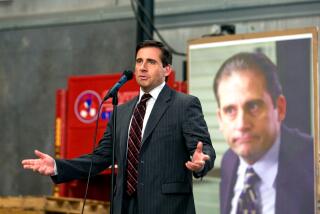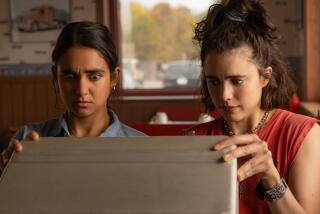Coens heist a classic comedy
Since the release of their neo-noir “Blood Simple” in 1984, Joel and Ethan Coen have kept the flames of movie love burning. In one after another of their features, the brothers have revisited classic film genres and bygone eras, carving out a signature filmmaking style with great visual flair and their trademark ironic deadpan. From the evidence, the brothers have a passion for film noir, gangster movies and screwball comedies, with a large place in their cold, cold hearts reserved for Preston Sturges. If the Coens loved people as much as they loved movies, they could be put up for sainthood.
But the Coens do not seem to like people and that is one reason why their remake of the darkly funny English comedy “The Ladykillers” is an uncharacteristic if unsurprising dud. Released in 1955, the original film was one of a number of sharply honed comedies produced at the London-based Ealing Studios beginning in the late 1940s and lasting through the mid-1950s. Some of the greatest Ealing comedies starred Alec Guinness, who pulled off an early career hat trick playing eight members of the same ill-fated family in the 1949 pearl “Kind Hearts and Coronets.” Six years later, Guinness astonished again in one of his greatest roles as Professor Marcus, the comically ghoulish, constitutionally inept criminal mastermind of “The Ladykillers.”
The remake follows the arc of the original story closely. The Professor -- now called Goldthwait Higginson Dorr III and played by Tom Hanks -- rents a room in a house owned by an old lady, here called Mrs. Munson. Beautifully brought to dainty comic life by Katie Johnson in the original and less agreeably by Irma P. Hall in the remake, the old lady believes she has opened her door to a gentleman. In truth, the Professor is a gentleman and a thief, and has rented the room as a base of operations. Pretending to be a musical quintet, the Professor and his cohorts -- Marlon Wayans, J.K. Simmons, Tzi Ma and Ryan Hurst round out the gang -- plan the heist as canned classical music fills the air. Then Mrs. Munson catches wind of their subterfuge and hence the film’s title.
It’s hard to think of the American equivalent of Guinness, whose chameleon talents fluidly spanned the full spectrum of both comedy and drama. Hanks has a long history of sliding between light and dark roles, but his gifts could not be more radically different from those of Guinness. Although he occasionally ventures into Big Acting, whittling down to supermodel size for a movie like “Cast Away,” Hanks never disappears into characters. Like most great American movie stars, he fills them up with his public self -- in this case, the signature blend of affability and core decency that constitutes his “Tom Hanks-ness” -- until he’s one with them. Now the consummate American Everyman, he is always and unmistakably also the star of the show.
Twirling a white cape and sporting a goatee and a snaggletooth smile, Hanks enters “The Ladykillers” looking rather like a dissipated Colonel Sanders. The actor works energetically to find the character under the costume and he plows through the screenplay’s reams of purple prose with sonorous dexterity. But while Hanks and the Coens both seem fond of the Professor, they never manage to put flesh on the conceit. Part of the problem is that the actor is simply too large a star for what is, essentially, an ensemble role. The greater problem is that the movie just isn’t funny. Grounded in caricature and played for loud, unmodulated laughs, the film suffers from the same problems that affected the Coens’ other big dud, “The Hudsucker Proxy” -- namely, little fun and no heartbeat.
In the first version of “The Ladykillers,” the old lady makes an ingenious foil for the Professor largely because she exists in a near-blessed state of innocence. With her high-button shoes, fin-de-siecle sense of propriety and ever-ready pot of welcoming tea, she is a relic from an earlier, nominally gentler era, specifically Great Britain before World War II. In theory, the decision to transpose the story to modern Mississippi and cast a black actress as the old lady who matches wits with a white man who thinks he can pull one over on her could have been a brilliant storytelling stroke. But only if the Coens had brought a comparable sense of time and place to their film, and had given their old lady something more than a Bible and some tired shtick.
It’s too bad that despite a lot of stirring gospel and roots music, and a desperately unfunny bit about the Freedom Riders, the Coens sidestep any opportunity to mine material from this new setting. The scenes between the Professor and Mrs. Munson sitting in her parlor, with the Edgar Allan Poe lover struggling to make conversation with the religiously dogmatic church lady, drag on without payoff and hover at the edge of offensive. Equally blanch-worthy is Wayans’ character, Gawain, whose stupidity treads perilously close to noxious stereotype. The Coens have always been equal-opportunity offenders and have generally reserved their most vicious comedy for their white characters. Which hasn’t been all that difficult since most of their characters have been white. There’s no doubt that political correctness invariably marks the death of comedy, but so too does such queasy lampooning.
Caricature is a signature of the Coens’ comedy, as is misanthropy. But in their great films -- “Barton Fink,” “The Big Lebowski” and “Fargo” -- caricatures exist cheek by jowl with recognizably human characters that take the chill off all the free-ranging cynicism. Even their second-tier films, like last year’s “Intolerable Cruelty,” have moments of truth wedged in between the laughs and cinephilia. Not so “The Ladykillers,” which feels so airless it could have been shot in an anti-gravity chamber. During the last half-century, any number of filmmakers, from Jean-Luc Godard to Martin Scorsese, have been inspired to greatness in large part by their movie love. But it isn’t enough for filmmakers to love movies; they must love or at least accept the human factor -- that movies are made by people for other people, not just your brother.
*
‘The Ladykillers’
MPAA rating: R, for language including sexual references
Times guidelines: Adult language, some violence
Tom Hanks...Goldthwait
Higginson Dorr III
Irma P. Hall...Mrs. Munson
Marlon Wayans...Gawain McSam
J.K. Simmons...Garth Pancake
Tzi Ma...The General
Ryan Hurst...Lump Hudson
Touchstone Pictures presents a Tom Jacobson production, released by Touchstone Pictures. Director-writers Joel Coen, Ethan Coen, based on a screenplay by William Rose. Producers Ethan Coen, Joel Coen, Tom Jacobson, Barry Sonnenfeld, Barry Josephson. Director of photography Roger Deakins. Production designer Dennis Gassner. Editor Roderick Jaynes (a.k.a. Joel and Ethan Coen). Costume designer Mary Zophres. Music Carter Burwell. Executive music producer T Bone Burnett. Casting Ellen Chenoweth. Running time: 1 hour, 44 minutes.
In general release.
More to Read
Only good movies
Get the Indie Focus newsletter, Mark Olsen's weekly guide to the world of cinema.
You may occasionally receive promotional content from the Los Angeles Times.










